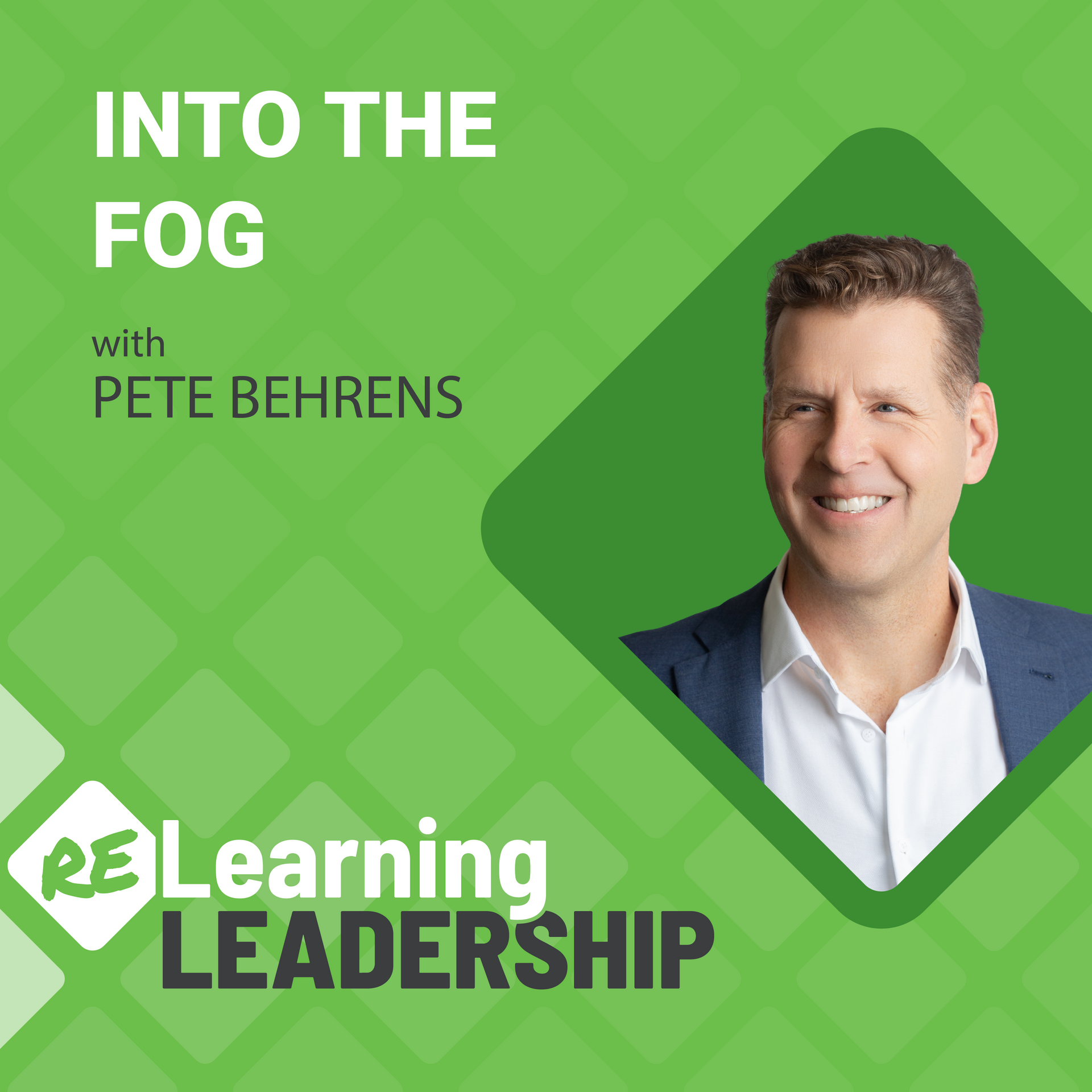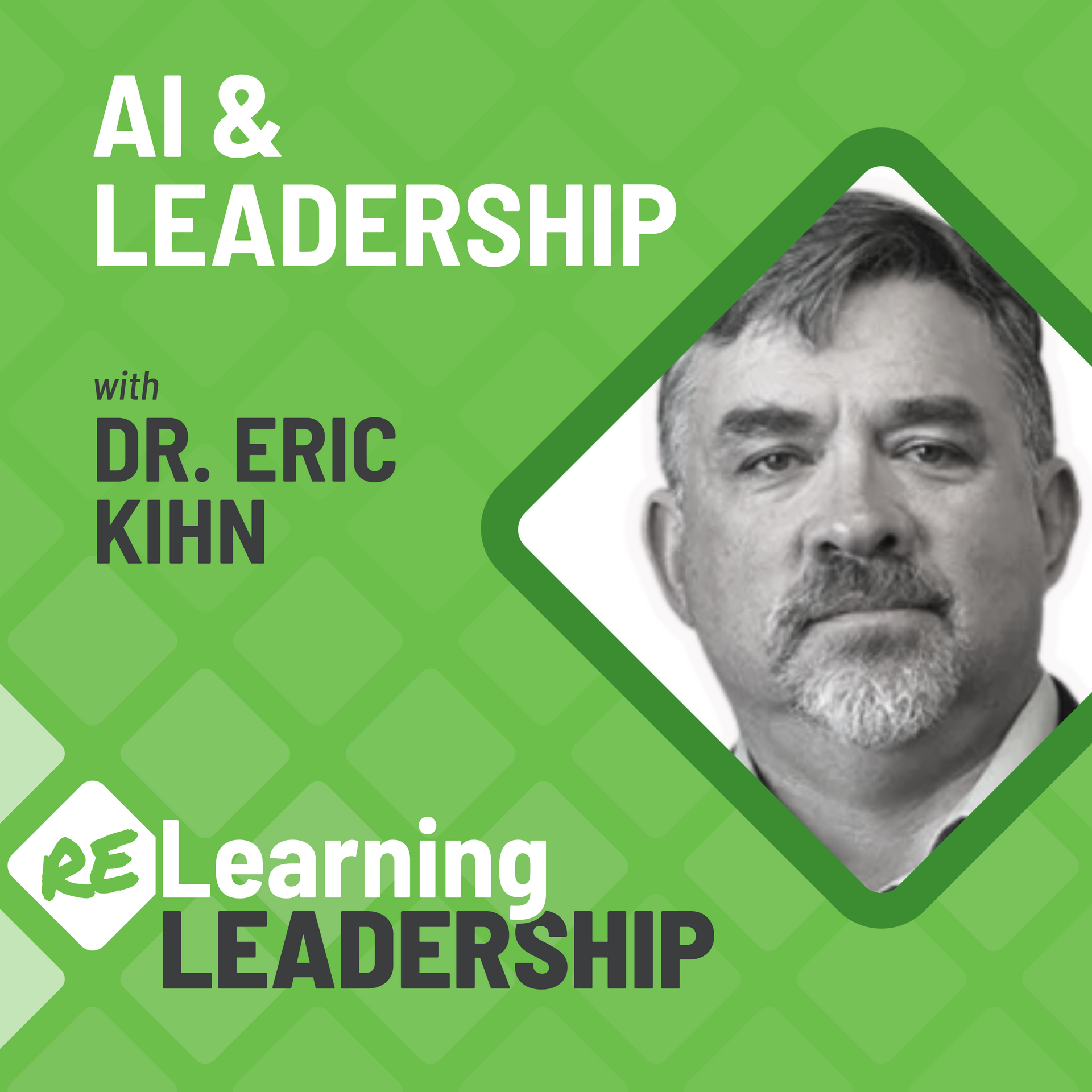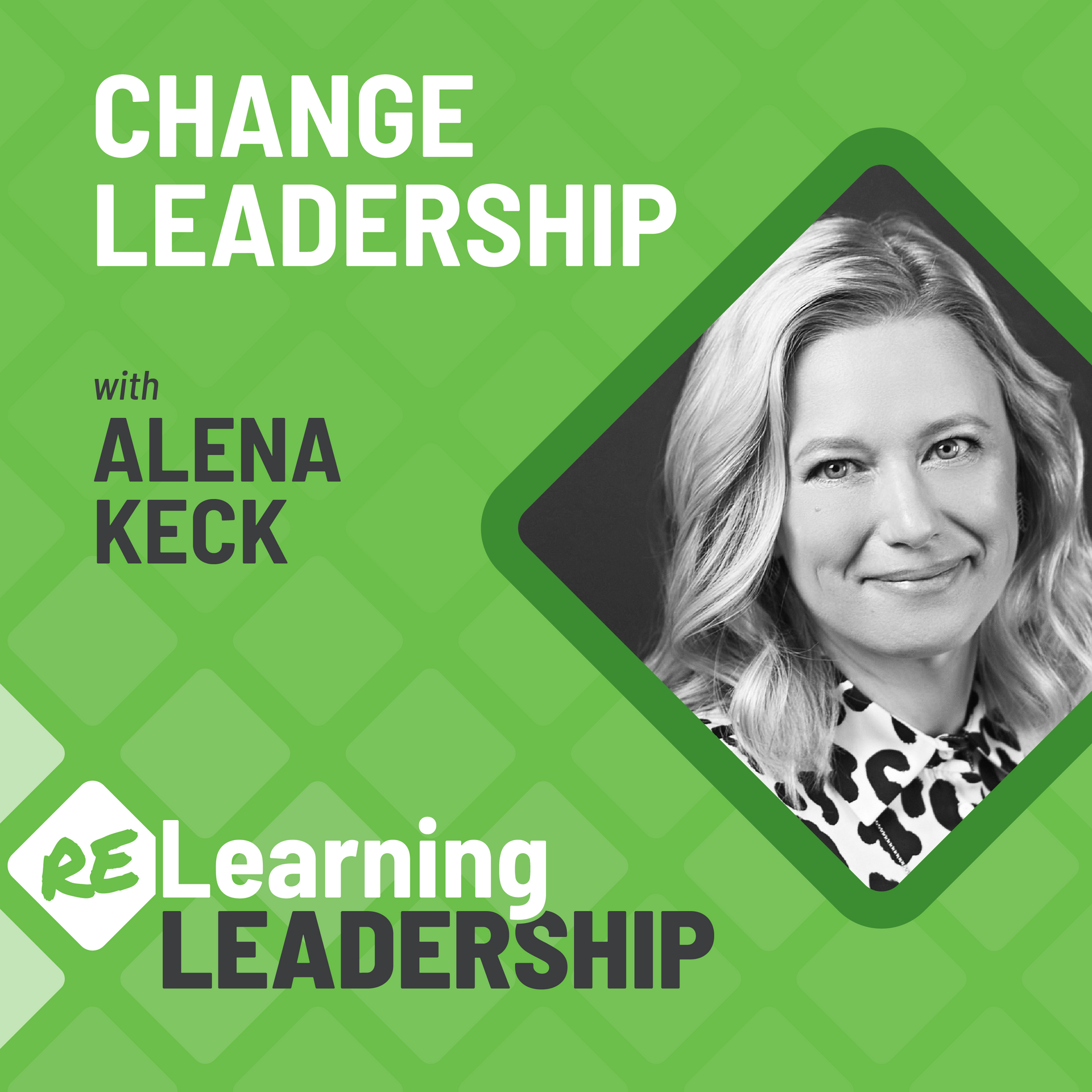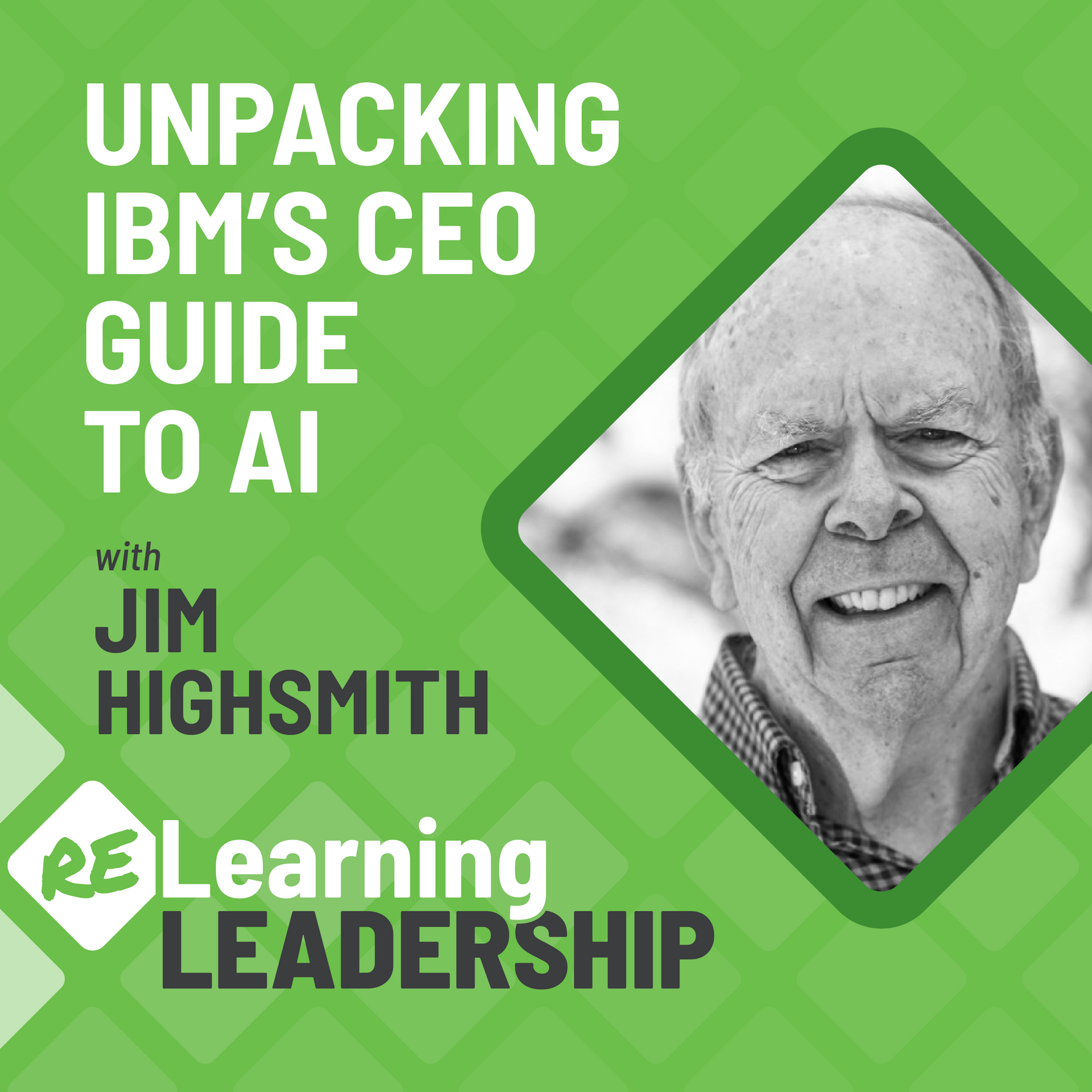7: A Lifelong Pursuit of Better
Why should a leader prioritize learning?
Dean Leffingwell, a business innovator and founder of the Scaled Agile Framework (SAFe), has dedicated his work life in pursuit of a better way forward, both as a leader himself, and in building companies helping others to be better.
Pete goes behind the curtain with Dean, not to explore his latest creation, but rather to explore the leader behind it. As a leadership mentor and advisor to Pete personally over the years, Dean shares his own leadership journey so we may learn from his experience.
Dean Leffingwell, Author, Serial Entrepreneur, and Software Development Methodologist
Dean Leffingwell is widely recognized as a leading authority on software development. He is the creator of the Scaled Agile Framework, and author of numerous books on software development. His most recent books SAFe Distilled, Leading SAFe Live Lessons, Agile Software Requirements, and Scaling Software Agility, form much of the basis of modern thinking on Lean-Agile software and systems development.
He is currently Chief Methodologist at Scaled Agile, Inc., which he co-founded in 2011.
Founder of five successful startups, including Scaled Agile, Inc., and Requisite, Inc., (acquired by Rational Software, now IBM), Mr. Leffingwell also served as Chief Methodologist to Rally Software, and prior to that, as a Sr. Vice President at Rational Software.
From the episode…
"I personally believe that the leadership model for the next couple of decades is learning. I think the companies that learn better are going to be better. If you're not learning at the same rate that technology—the business—is changing, you're going to be left behind."
Connect with Dean
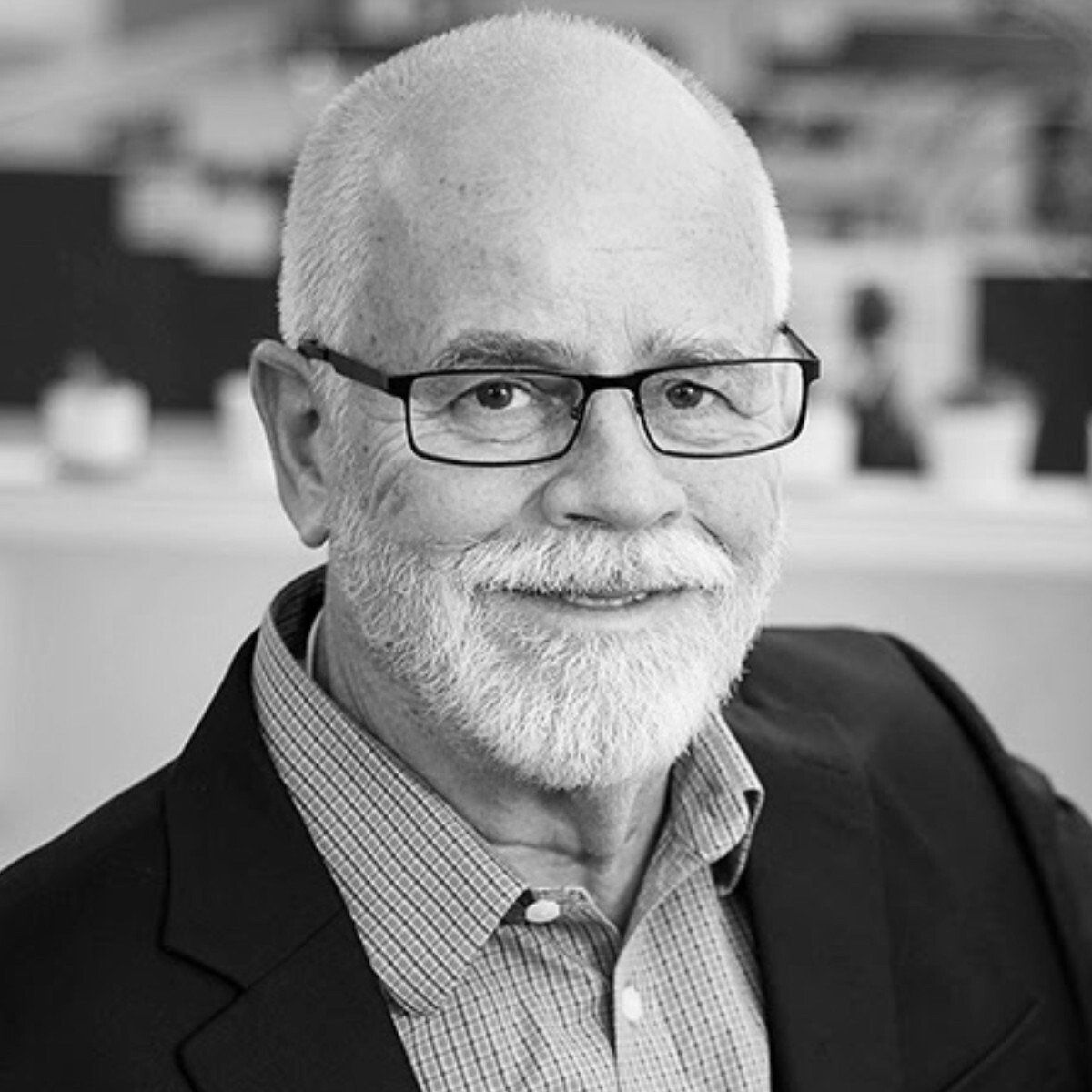
Relearning from Dean's Insights…
I admire Dean’s innate business acumen to connect real customer needs with valued solutions and turning that into a successful growth business. This discussion personally brought me back to my early days as a young leader, working within the companies he helped shape. And I believe some of my own passion was fueled through my engagement with him. Thank you, Dean, for setting that example for me.
What we DIDN’T explore in this episode is his latest creation, the Scaled Agile Framework (SAFe). Rather, we explored the leader behind it. Dean is a serial entrepreneur, an author and a disruptor of the way we engineer new products. Through this episode, Dean shares some of his own leadership insights and what he has learned through his career in advising leaders and organizations. I hope our discussion was valuable to you as it was to me.
There are some great learning for leaders within the episode we don’t share here, like his view on project management and personal MBOs (Management by Objectives). I encourage you to listen to the episode for some of those insights. In addition, here are some key themes:
Discover your passion
Dean’s passion is finding a better way to engineer new products. Where is your passion for something better? When you orient your work around your passion, you may not have to “work” another day in your career.
Grow your library
If you are not learning at the pace of technology and business, you are falling behind. Find the books that interconnect fields together, like business and technology or leadership and science. Personally, I have found my best learning came from books outside of my specialty.
Surround yourself with people smarter than you
For me this is easy :) We don’t get smarter by reading books. We get smarter by integrating the ideas from those books in our domain and with others who see those ideas in different ways. The arc of creativity bends towards intense collaboration.
Keep Practicing
Dean illuminates that passion, focus and learning need no boundaries. Keep exploring and challenging your own boundaries for growth.
Episode Transcript
Pete Behrens:
What can we learn from a lifetime pursuit of a better way to work? Welcome to another episode of Relearning Leadership, where we explore leadership challenges and break them down to help improve your leadership, your organization…and even your personal life. Today, we meet Dean Leffingwell, an innovator, founder, author, investor, advisor and “serial provocateur” of the leadership journey and consummate pursuer of a better way forward.
Dean Leffingwell:
I personally believe that the leadership model for the next couple of decades is learning. And I think the companies that learn better are going to be better than those that don't.
Pete Behrens:
Dean and I look back at what shaped his leadership path, what fuels his lifelong strive to improve the way we work, and what we can learn from his decades of disruption and delivery. Following our discussion, I share what I (re)learned from Dean and his ever insightful perspectives. I’m your host, Pete Behrens, founder of Agile Leadership Journey and 30-year veteran in corporate leadership—both as a leader myself and in guiding other leaders. Thank you for joining us today. Let’s dive in.
Welcome to the show, Dean.
Dean Leffingwell:
Thanks, Pete! Thanks for having me. It's been a while since we've chatted.
Pete Behrens:
It has been too long. For my Agile friends, I know you're going to recognize the name Dean Leffingwell quite well. For the rest of you, let me introduce him. Dean's founded five successful startups, including his latest Scaled Agile. He's authored four books on software development process, including his latest SAFe Distilled. He's a chief methodologist and co-developed multiple product development frameworks and has served as tech investor and leadership advisor to multiple tech companies.
Yet even my Agile friends might not recognize Dean was also a significant mentor for me personally as a leader, both as a founder of Requisite, Inc. in my early tech leadership days, and later as an advisor to Roving Planet, where we both discovered the promise and the pitfalls of agility.
But let's take a step back. So Dean, I'd like to hear from you a little bit about how you got started into leadership. What sparked you?
Dean Leffingwell:
Well, I grew up in a small town, and my father was an entrepreneur. Now, not our kind of entrepreneur, right? He drove a truck, and then he hired, then he bought another truck, and then he hired truck drivers. So as I grew up, he was the boss. And he was the boss in every traditional sense of being the boss back in the 50s and 60s. He was respected for sure, and his people loved him, but he was tough. It was a fact.
When I went into tech then, I had a couple of early entrepreneurial experiences. And in both cases they were not successful, and I wasn't in charge. So at some point—I remember at the time I had a four-year-old daughter to take care of. I was recently divorced, and I said, “I got to be able to feed this kid, and I'm depending on other people for my income and just a lifelong of growing up.” I said, well,
“I want to depend on me,” because my dad fed our family because he was an entrepreneur.
So I started off basically with the commitment. I said I'm probably the only person that I can work for. [Laughs] I doubt I could work successfully in a large enterprise anyway, and somebody's going to be responsible for my paycheck, and that's going to be me. Now we dropped the AirPod here.
Pete Behrens:
No worries. So Dean, I can see where early on you were already starting to make things better. Even the fact that you were working for these companies that weren't working and realizing it's not good enough. Is that how some of your focus around changing the way we work was thought, or how did that come about?
Dean Leffingwell:
There's parallel elements in my life. I remember back in the day, if you will, I would read Electronic Engineering Times and Businessweek. I have no idea if those things are even alive anymore or not, right? Everything's online; I don't know if they've survived. But I’ve always had this fascination with business just because it's an immensely interesting puzzle. And I started out as a software developer, and within years of doing that I got frustrated because I, frankly, couldn't see the engineering that was needed to build great systems in the craft of software. How can you make great, great systems where the laws of physics don't apply?
And my background is biomedical engineering and aerospace engineering. Those are my degrees. And there are laws of physics there, and there are laws of biology. We don't have those laws in software. So I became really fascinated by that problem. As I got frustrated with the way of working and the methods, to me, it was like, well, this could be what I do. There wasn't a wake-up call that said, “Let's just do that.” I just started doing it.
And that's been really—people say, you know, lots of startups, lots of careers—actually, only one job. I honestly got tired of doing software development and doing my best job, or having my teams do their best job, and then at the end of that, at the release, taking a beating. [Laughs]
You know, it's like, we build systems that have never been built before, and everybody's mad because it's buggy and it's over budget. It's research and development, people! You can't treat it like making a widget. So I got frustrated with that, and I said, you know, as a developer, as a member of that community, we do great things, we should get psychic rewards. And maybe, you know, a pat on the back's not a bad thing, as opposed to “Let's go through your budget variants and figure out why you were late and why this feature didn't get in here.” And it's like, “Sue me! Look, we're building systems that have never been built in the history of mankind, and you can't do that on a fixed price and fixed budget.”
Each company—you can go through in my history—they all did the same thing, which is, can we help people build bigger systems better and help those who are doing the work feel a little better at the end of the day. We help thousands of companies build better systems. They help tens of thousands and hundreds of thousands of users improve their lives. So the reality is, there's literally billions of people that are affected. When you can help the development community—systems engineering, software engineering, hardware engineering, etc.—build better systems, the general public at large, the welfare of the people on the planet, has improved because the systems are better. Whether it's a better elevator, whether it's a zero-emissions car, whether it's AirPods that don't fall out of your ears, all of those things affect our everyday life. So it's a huge leverage point.
Pete Behrens:
So, if people did not get the passion out of what Dean is about, you need to go back and listen again. So there was a tremendous amount there, Dean, and a couple of things I want to point out. Number one, you come from an engineering background, and that's often lost in the people.
And I know even when I was with you, you had such a strong business sense and such a strong business orientation. And I didn't know you as an engineer. I saw you as a very sharp, tactic business person. And I'm wondering—there's a lot of leaders who, in the tech world, have trouble making that business orientation. Is there something you can help us with in our leadership, in how that comes about, or is there something you're seeing in tech leaders that can help bring this out in them?
Dean Leffingwell:
Well, I wish it was more natural, right? Because as you go through the technical leadership ranks and you grow up with this expertise paradigm—you know, the technical leader as manager—there's a trap there as well. Which is that the skills are fundamentally different. The skills of building a business are understanding markets, customers, users, economics. I mean, I can read a balance sheet. I've been able to read a balance sheet since I was 27. Those are a different set of skills. So they don't always come together in the same package. And I think that is a challenge that we face in the industry, which is, how do we get the business skills at the executive level to start making good decisions?
And as we work
now with our executives in the industry—and I do a fair amount of that—we've talked about, in the past, various leadership models. Pete, you know them. There’s certainly command and control, there's Taylorism, there's transformational leadership, there's servant leadership. I personally believe that the leadership model for the next couple of decades is learning. And I think the companies that learn better are going to be better than those that don't.
So what we're trying to instill when I work with executives is, yes, you get better, and you get more expertise, but don't fool yourself. If you're not learning at the same rate that the technology and the business is changing, you're going to get behind.
So what I try to do is
just put a challenge in front and say—you're going to read Jeffrey Moore, who's one of my one of my heroes, and you're going to read Reinertson as well, on the technical side. So you're just going to have to start balancing the tech side with the business side. I'm looking at your—we've got five books already—I see
The Fifth Discipline behind you and see three other books that we have in common. The Fifth Discipline is not really a technical book.
Pete Behrens:
No.
Dean Leffingwell:
Right? It's a systems thinking book. But when you understand systems, you can apply that to your business, and you can apply that to technology as well. So I wish there was a pill, but there isn't. I just happened to be fortunate, grow up entrepreneur, always fascinated by business, and I was able to be really fortunate in combining both my business aspects and the technicals into a single career. And I can honestly say, I've had some bad days at work, for sure, but I don't really feel like I've ever worked a day in my life. I've always done what I wanted to do that day. And if that day was a riff, okay. Did I really want to do that that day? Yes, because that's what I had to do as an executive that day. And that's why I'm not retired. My social security check has been clearing for years now. [Laughs]
Pete Behrens:
Yeah, it's fascinating to hear. We often struggle with that difference between product value and learning value and those curves, and it sounds like what you're saying here is, to some degree, over time learning value is becoming as or more important than product value. “Are we delivering the right things? Are we creating the right things? Are we focused on the right things?” is as or more important than the things we're doing.
Dean Leffingwell:
I truly believe that in our, kind of, knowledge area—we hire smart people all the time. I've served on boards all my life. I've never seen a board say we should go out and recruit some B people to run the company. [Laughs] Everybody recruits the best people you can have. So you're not generally smarter. So a strategy that says, “We're smart enough to figure that out,” is not very good. We can generally be different. So in the area of the work that I've done and the work that we did together, at places like Rational, we were different. We were really good at what we did there.
Pete Behrens:
Hm. You mentioned being on the advisor side, the board side. You've played that role very, very well across many companies. Is there something you wish leaders would do, or would know more, to be more effective on that side? What do you look for?
Dean Leffingwell:
I think in most of the companies that I've helped consult and grow, there's a point at which they get successful, and they start to do two things. They'll go out and hire somebody to run a PMO organization. And some executive will say it's time to put MBOs in place, Personal MBOs. So we're not mature if we're not uniquely motivating each individual to their best work. Neither of those things really work. Now I have a great respect for program management. If you build the right systems, you can get programs in a semi-autonomous mode. But as soon as you put an individual MBO in place, you're going to set one person against the other no matter how you look at it.
So I mostly help executives avoid some of the pitfalls and trappings of what growth should look like. We should have more hierarchy here, we should make sure that nobody has more than seven employees, we should have individual MBOs, we should have incentives for teams and for programs. I don't really believe that. I believe that the people that we work with are intrinsically motivated to do their work. And mostly we have to get out of their way. But that's mostly. It's not entirely out of their way. I do not believe in the holacracy of, “We've hired 100 people,
so we should go ask them what we should build.” We hired them to build a thing.
I believe very much in decentralized decision making, but I also believe that strategy has certain properties of centralization.
Some people are going to decide—for example, when we recently expanded our headquarters in Boulder right before the pandemic, we made a key decision to make a long-term investment. There's no collective ownership for that. An employee is not going to pay the rent, we're going to. So there’s certain elements of strategy that say, “We've got to go this way.” And not every employee is going to believe that that's the right thing to do. So I think that leaders have a responsibility for strategy; they have a responsibility to communicate. And I think that they should lead.
I look for certain innate leadership qualities. And there's a certain boldness to it. Not everybody I've worked with likes me [laughs] because I'm bold. I want to get things done. And what I’ve found is that that works for me. It's my style. It's not a perfect style. It works. It does inspire people that want to go that direction. But if they don't want to go that direction or, frankly, they're not able to go that direction, they're not going to think I'm the best manager they've ever had. They're going to think, “Well, he's kind of a jerk because he's taking us down this direction, and he didn't ask me whether or not we should get out of that business and get into the other one.”
Pete Behrens:
Yeah, I think you've got a little bit of that tough dad in you—
Dean Leffingwell:
Yup, I do. I do.
Pete Behrens:
—that you talked about earlier. So, I think what I would interpret as one of your superpowers is the ability to balance. And you’ve talked about a few things here. Business and tech balance. The human side—but also building a system that humans can operate in effectively—balance. And I know in the Agile community, there's this balance between, openness and freedom and empowerment, but also we need some alignment and connection, and togetherness, and I think one of those things that I think you've done extremely well, both in business but also in the methodology side, is finding that balance.
Dean Leffingwell:
Yeah, I mean it's part and parcel of the same thing, right? The business opportunity has to match a technical opportunity and vice versa. You have to be capable of executing your vision. So if you've got plans to, you know, leap tall buildings in a single bound, and you're not Superman, that's going to be a flawed strategy. So I think being grounded in technology and being able to talk to developers and engineers and know BS when you hear it and know the insights when you hear it, helps me understand how to make better decisions as an executive. It's almost like, you know, Product Management 101. Is it viable, feasible, and sustainable? And you kind of have to know ahead of time whether that's likely to be the case.
Now, because of our Agile methods now and the way we work, it's easier to find out than it used to be, because we can just try something. We can put a spike out there, and we can ship something and get feedback. So it's easier to experiment than it used to be, but you’ve got to have a certain instinct that says, “I think this is going to work.” So again, I think the advice to leaders is to be grounded in a thing that you're passionate about and you know something about.
Pete Behrens:
You're describing a lot of this passion, this connection. What's ironic to me, a little bit, is, here you are as a leader who has trouble being led. self-admitted that—
Dean Leffingwell:
I do.
Pete Behrens:
—Yes, I'm similar in that way. But most of the leaders listening to this, and most of the leaders out in the world, are inside larger companies. Can you relate to them, or do you have any advice for them on how they can find their path inside there without, maybe, having that ability to start their own company?
Dean Leffingwell:
Increase their pace of learning. The world is so loaded with information now that my advice to executives and leaders is always the same. We’re not thirsting for knowledge on any dimension. Systems thinking, product development, Lean flow, the business of business, technology adoption. It's just a vast treasure. Increase your learning, and in that process, you'll find a book or a thread and say, “I think that's interesting.”
I work with Andre Durand frequently. He always seemed to me to be one of the smartest people I ever met. Well, I figured out why: because he spent all his time talking to people that were smarter than him. So he grew his knowledge by reaching out constantly. I do some of that, but I'm a little too introverted to be as good as he is. But like your bookshelf back there, if you turn around over there, I've got three or four books live at any one point in time, and they could be a business book—I’ve got
Practical Lean Accounting, I've got
Upstream
by Dan Heath, I've got
Competing in the Age of Digital [Convergence], and I've got Mik Kersten’s book, because I'm still trying to understand exactly what he meant by it.
[Laughs]
Pete Behrens:
So Dean is not done learning.
Dean Leffingwell:
I'll tell you this: when I'm done learning, I'm done done, Pete. That'll be my last interview at that point. “What do you do now that you quit learning?” I’m dying slowly, okay. [Laughs] There's no substitute for a bookshelf, Pete.
Pete Behrens:
You're painting a picture of a continuous learning curve, and that's why we call this podcast (Re)Learning Leadership, because I think it's continuously changing, and I think the things even I was taught and even I learned earlier aren't serving us as well today. Are there any particular failures, if you were to get vulnerable here a bit, that redirected you?
Dean Leffingwell:
Yeah, so I'm on a learning journey too, right? Of all the things my dad said in discussing directions around business, the following words were never heard: “How do you feel about that?” [Laughs] That didn't happen, okay? But how you feel about that is important, so I'm learning basically as a Lean Leader to interact with people in a way where my passion and enthusiasm doesn't overpower them.
And the mistakes I’ve made recently, my last really bad one, was I just shot the messenger. And this person, honestly, I don't think she forgave me. I'm sad about that, because I really did apologize. But I think I shot the messenger, I don't think she really fully accepted my apology, and I feel terrible about that. Now, what kind of leader, after 45 years, shoots the messenger of bad news? I hate it when I do that! So I continue to struggle in those areas.
At the same time I get increased sensitivity to it. At the same time I'm absolutely more collaborative. I work in a group right now—just got off the phone with a couple of teammates—where, frankly, the ideas they had were better than what I went into the meeting with. I immediately recognized that. So there might have been a time, I don't know, 20 years ago, I would not necessarily recognize that. I have a much higher degree of recognition now. I can see those things and not be enamored of my own ideas. And there are others that I have the experience and the skills and the knowledge base to say “No, I think this is really the right way to go.” And being able to sort the two is different.
And the problem as a leader is, I can't tell which ones are which. So what I've become addicted to in my later career is surrounding myself with people that can tell, or who will at least have the debate. Now not everybody can debate with me, because I'm too passionate, and I'm tough, and I argue to think. That's not everybody's style. I argue not because I believe in the argument. I argue because I'm testing these ideas in my mind, and that's the way I express myself. So I've learned as a leader over time to find the people that can contribute what needs to be contributed and will argue with me, and that will also go, “I think you're right about this one.”
And they also have to step up. So, the lack of a decision is an incredibly high cost of delay. So leaders that can listen, get the right consensus, and then decide, are the leaders I like to hang around. And it's not going to be the same people every time. It's not my three trusted buddies. I trust different people for different reasons. You would trust different people with your money than you’d trust with your kids. So the ability to find the people that know more than you do, to interact with them, to listen first, which is always one of the things I have to caution myself about, and to then come to a consensus and decide, but make the decision, is I think the leadership skill that I would recommend to others in middle and senior management.
Pete Behrens:
I can vouch for the fact that that behavior in Dean hasn't changed. He argues out loud and likes the pushback, so anybody working with him, good advice there. Well, Dean, this has been fascinating to get under the covers a little bit with you and to understand a little bit about what makes you tick. I'll give you the final word if there's any final thoughts you want to put on this, as far as a bow.
Dean Leffingwell:
As far as a leader, there is a passion somewhere in you, and it's related to your work. Find that, exploit it, and just increase your learning. You can become an expert in an area that's as narrow as you define it, and as you have that expertise you'll make better decisions, and you’ll help other people make better decisions as well. So, continue your learning, and don't think that that stopped with your master's degree, is the best advice I can give.
Pete Behrens:
Well, thank you very much, Dean. I really appreciate you sharing your thoughts with us today.
Dean Leffingwell:
Well, thanks, Pete. Thanks for having me. It's good to connect again. See you in five years when your book is done.
Pete Behrens:
No, we gotta do it before that. [Laughs]
Dean Leffingwell:
Okay, okay. [Laughs]
Pete Behrens:
Wow. To exude the passion and energy Dean carries with him well past the average retirement age of most leaders, is beautiful to hear. I admire Dean’s innate business acumen to connect real customer needs with valued solutions and turning that into a successful growth business. This discussion personally brought me back to my early days as a young leader, working within the companies he helped shape. And I believe some of my own passion was fueled through my engagement with him. Thank you, Dean, for setting that example for me.
Let me summarize what I am taking away from this discussion. First, discover your passion. For Dean, it was finding a better way to engineer new products. Where is your passion for something better? Orient your work around your passion, and you may not have to “work” another day in your career. Second, grow your library. If you are not learning at the pace of technology and business, you’re falling behind. Find the books that interconnect fields together, like business and technology or leadership and science. Personally, I’ve found some of my best learning is from books outside of my specialty. Third, surround yourself with people smarter than you. For me, that’s pretty easy. We don’t get smarter by reading books. We get smarter by integrating the ideas from those books into our domain and with others who see those ideas in different ways. The arc of creativity bends towards intense collaboration. And finally, keep practicing. Dean illuminates that passion, focus, and learning need no boundaries. Keep exploring and challenging your own boundaries for growth. That is something all leaders can (re)learn to do better.
Thank you.
Relearning Leadership is the official podcast of the Agile Leadership Journey. It’s hosted by me, Pete Behrens, with analysis from our global Guide community. It’s produced by Ryan Dugan. With music by Joy Zimmerman. If you loved listening to this podcast, please leave us a review. And visit our website, relearningleadership.show, for guest profiles, episode references, transcripts and comments, and more. And to (re)learn more about your own leadership, visit us at agileleadershipjourney.com.
Explore:
Recent Episodes

